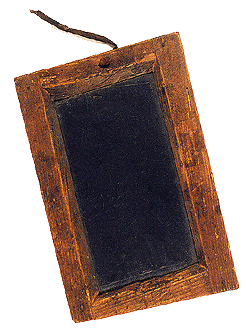School in Kaplice
The school of Kaplice forms an important chapter in the history of the elementary education in the region of Český Krumlov, was established by Ferdinand Kindermann in the second half of the 18th century. He worked in the school as a dean since 1771. Thanks to his efforts this school had become a model for other similar institutions. During his theological studies in Praha,
 Kindermann had attended
the lectures in pedagogy of the enlightened professor Seibt, who
considered the quality education and presumption for creating
social changes in the state. Kindermann, a pioneer of school
reforms has been influenced as well by the organization of
elementary schools in Zahan (in Poland) where he spent his
sabbatical. Kindermann then used his knowledge in reforming the
school in Kaplice with support of the master of the local Nové
Hrady estate - count Jan Nepomuk Buquoy (1741-1803). The Buquoys
occupied themselves not only with the improving the of school
quality but also with taking care of the poor, which - in the true
spirit of enlightenment, should lead to higher standard of living
for all inhabitants of the estate.
Kindermann had attended
the lectures in pedagogy of the enlightened professor Seibt, who
considered the quality education and presumption for creating
social changes in the state. Kindermann, a pioneer of school
reforms has been influenced as well by the organization of
elementary schools in Zahan (in Poland) where he spent his
sabbatical. Kindermann then used his knowledge in reforming the
school in Kaplice with support of the master of the local Nové
Hrady estate - count Jan Nepomuk Buquoy (1741-1803). The Buquoys
occupied themselves not only with the improving the of school
quality but also with taking care of the poor, which - in the true
spirit of enlightenment, should lead to higher standard of living
for all inhabitants of the estate.
Right after his arrival in Kaplice, Kindermann put all his efforts to the local school, which had been in a very poor condition. All the children were being taught in the same classroom, the discipline was lax and the building quite derelict. The teaching was rather mechanical without a deeper grasp of the subjects. Kindermann's first step was to separate the children according to their age. Count Buquoy equipped the school with basic furniture and books and at the same time established a foundation for two teachers. The educational principles set by Ferdinand Kindermann included offering a complete education, to teach subjects which are practical and useful, not to use empty words but practical examples, to exclude any violence against the pupils, to inspire interest and the natural inquisitiveness of the children. The big problem was to ensure a regular attendance of the village pupils. They were expected to help in the fields and workshops at home (shepherding, field work, weaving of linen treating wool and so on). The regular attendance ran at about 50% of the children. The other problem was the school fee, especially for the poor. Kindermann tried to bring in all children by giving books and other needed material free.
He also tried to persuade and convince the parents about the importance of education for the future of their children. The advantage of Kindermann's principles was a complex system of allowing the students to obtain all basic information from different disciplines. Apart from reading, writing and calculus the children were aquatinted with the principles of music, history, arithmetic, geometry and they gained the basic knowledge of Greek and Latin as well as ethics. Also included were religious studies, calligraphy, grammar, composition and memory exercises. The summer was used by Kindermann for practical education in the school garden, to teach the children how to grow fruits and vegetables for the improvement of agriculture in this region. The teachers in Kaplice begin to specialize in certain subjects. Until now one teacher taught all subjects, without going too deep. Kindermann was also mindful to have a Czech speaking teacher for the children from the local villages. The German language was the norm otherwise, Kindermann was not a supporter of a conscious Germanization, which was pushed by the state policy.
The school in Kaplice became famous - teachers and clergymen, sent by towns or nobility came to study the experience of Kindermann, and take it to their own localities. The influence of the school in Kaplice was evident at schools in Český Krumlov, Vyšší Brod, Jindřichův Hradec and others. Kindermann's talent and capability were appreciated by his appointment as a head of a commission which had the task to supervise all elementary schools in the Czech territory. The establishment of the commission came as an end result of the complex reformation of the educational system of the whole monarchy in 1774, initiated by empress Maria Teresia.
(zp)
Further information:
History
of Education in the Český Krumlov Region

